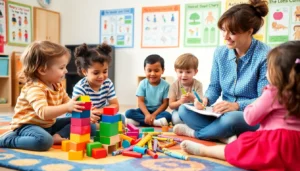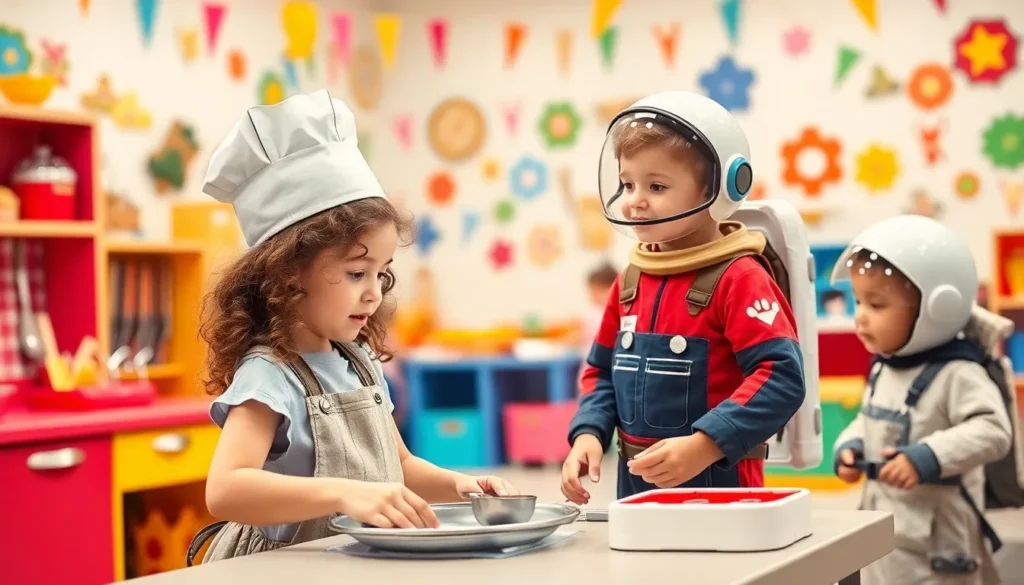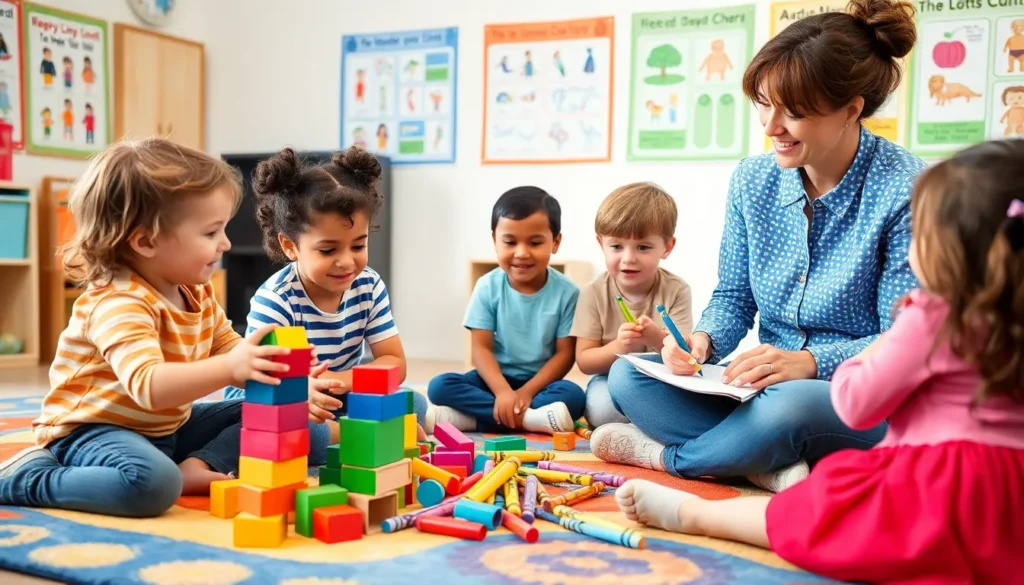Table of Contents
ToggleIn a world where toddlers are mastering the art of tantrums and negotiating snack time like seasoned diplomats, play-based learning emerges as the secret weapon for early childhood education. It’s not just about letting kids have fun; it’s about teaching them to problem-solve, collaborate, and unleash their creativity—all while pretending to be astronauts or dinosaurs. Who knew that a cardboard box could become a spaceship?
As parents and educators dive into the wonders of play-based learning, they’ll discover that this approach isn’t just child’s play. It’s a powerful method that nurtures critical thinking and emotional intelligence, setting the stage for lifelong learning. So grab your crayons and get ready to explore why play is the best teacher in those formative years. After all, if learning can happen while having fun, why not let the games begin?
Understanding Play-Based Learning in Early Childhood
Play-based learning serves as a vital approach in early childhood education. This method fosters holistic development while engaging children in enjoyable activities.
Definition and Importance
Play-based learning involves integrating play into educational settings. This approach emphasizes not only enjoyment but also skill building. According to experts, play nurtures cognitive, physical, and emotional growth. Engaging in play allows children to explore their environment, enhancing their curiosity. This framework supports problem-solving and collaboration skills. Research indicates children exposed to play-based learning often demonstrate higher levels of creativity and critical thinking. Such foundational skills contribute to lifelong learning.
Key Principles of Play-Based Learning
Key principles shape play-based learning, ensuring effectiveness. Child-led experiences empower children to direct their learning. Environmentally rich settings promote exploration and interaction. Social play fosters communication, enhancing peer relationships. Adults play a supportive role, guiding without dominating. Constructive feedback encourages children to reflect on their actions and thoughts. Learning through meaningful experiences deepens understanding, making knowledge retention more effective. These principles create a vibrant, engaging atmosphere conducive to learning and growth.
Benefits of Play-Based Learning
Play-based learning offers numerous benefits that significantly impact early childhood development. This approach promotes holistic growth, allowing children to thrive across various domains.
Cognitive Development
Cognitive development flourishes in play-based environments. Children engage in problem-solving and decision-making through hands-on activities. These experiences foster critical thinking skills and enhance creativity. Engaging in imaginative play unlocks new perspectives and innovative ideas. Research indicates that children involved in play-based learning display improved memory retention and language acquisition. Incorporating play makes learning enjoyable, which heightens motivation and encourages exploration. As a result, cognitive skills develop naturally within a stimulating setting.
Social and Emotional Growth
Social and emotional growth thrives in play-based learning contexts. Children learn to navigate relationships while interacting with peers during cooperative play. Shared activities build empathy and understanding of others’ feelings. These experiences also create opportunities to practice communication and conflict resolution skills. Children involved in play-based learning often exhibit greater self-regulation and resilience. Observation shows these children adapt better to challenges and manage emotions more effectively. Active engagement in play helps develop a strong sense of identity and belonging.
Types of Play in Early Childhood Education
Play in early childhood education encompasses various forms that contribute to children’s development. Understanding these types enables educators and parents to facilitate enriching experiences.
Free Play
Free play occurs when children choose their activities without predetermined goals. They explore their interests freely, fostering creativity and independence. This type encourages self-direction, allowing children to engage in imaginative scenarios. Research confirms that free play enhances problem-solving skills and strengthens cognitive development. Through interactions with peers, children navigate social dynamics and build relationships. This engagement also promotes emotional regulation by allowing expression of feelings in a safe environment. Ultimately, free play cultivates engagement and exploration integral to learning.
Structured Play
Structured play features specific guidelines or goals, often designed by adults. Activities such as games with rules help children understand the importance of cooperation and teamwork. In this framework, educators provide resources and challenges that stimulate cognitive growth. Children involved in structured play usually exhibit improved focus and discipline as they work towards shared objectives. Such play scenarios foster critical thinking as children strategize and problem-solve within given parameters. Structured play balances guidance with opportunities for creativity, ensuring children learn essential skills while still enjoying the process.
Implementing Play-Based Learning in the Classroom
Implementing play-based learning in classrooms involves intentional strategies that create engaging experiences for children.
Creating a Play-Friendly Environment
A play-friendly environment includes accessible materials and stimulating spaces. Safety and exploration opportunities must be prioritized to encourage children’s curiosity. Classrooms should feature diverse resources, like art supplies, building blocks, and nature elements. Designated areas for different types of play—such as imaginative, sensory, and cooperative—further enhance learning. Spaces that reflect children’s interests promote ownership and engagement in their learning journey. Flexibility in arrangement allows for both quiet reflection and active play, supporting various learning styles.
Role of Educators in Facilitating Play
Educators play a crucial role in facilitating play-based learning. They act as guides, observing and listening to children’s interests while offering support. By asking open-ended questions, educators spark deeper thinking and exploration. Their presence during play helps foster social interactions, encouraging cooperation and negotiation skills among children. Adult involvement balances guidance with freedom, ensuring that children feel supported yet independent in their learning. Professional development opportunities can enhance educators’ understanding of effective play-based strategies, ensuring a rich learning experience.
Challenges and Considerations
Play-based learning offers numerous advantages, yet several challenges must be managed effectively.
Balancing Curriculum with Play
Curriculum goals often compete with play-based approaches in early childhood education. Educators must ensure that learning objectives align with play activities without sacrificing the play experience. Integration of structured goals into play involves careful planning and flexibility. Children benefit when educators design activities that encourage exploration while meeting required standards. A focus on outcomes doesn’t mean eliminating play; it enhances learning through enjoyable experiences. Maintaining this balance supports creativity and cognitive development in children.
Addressing Diverse Learning Needs
Diverse learning needs present unique challenges in play-based settings. Each child brings individual strengths and preferences to play, demanding tailored approaches. Educators must observe and adapt activities to ensure every child is engaged and challenged appropriately. Small group interactions can foster collaboration among children with varying skill levels. Differentiation in play activities promotes inclusivity, allowing all children to thrive. Embracing these diverse needs maximizes developmental benefits and nurtures a supportive learning environment.
Play-based learning stands out as a powerful approach in early childhood education. By integrating play into learning, it nurtures essential skills that shape a child’s future. This method not only promotes cognitive and emotional growth but also fosters creativity and problem-solving abilities.
As parents and educators embrace play as a vital teaching tool, they cultivate an environment where children thrive. The balance of structured and free play allows for exploration and discovery, making learning both enjoyable and effective. With the right support and resources, children can develop a strong foundation for lifelong learning, ensuring they’re well-prepared for the challenges ahead.










